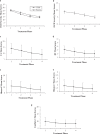Change Patterns During Family-Based Treatment for Pediatric Obsessive Compulsive Disorder
- PMID: 36415311
- PMCID: PMC9668710
- DOI: 10.1007/s10826-022-02479-8
Change Patterns During Family-Based Treatment for Pediatric Obsessive Compulsive Disorder
Abstract
Cognitive behavior therapy (CBT) for young people with obsessive compulsive disorder (OCD) has recently been enhanced to target family environment factors. However, the process of change for OCD symptoms and family factors during treatment is not well understood. Uniquely, we explored patterns of change for OCD symptoms and a range of family variables throughout Baseline, Early, Mid, and Late treatment phases of family-based CBT (FCBT) for 15 young people with OCD using multiple informants. We predicted a linear reduction in OCD symptom severity and family accommodation (FA) across treatment phases, however the investigation into other family factor change patterns was exploratory. OCD symptom severity, FA, parental distress tolerance (DT), and conflict all showed significant linear change patterns across treatment phases according to multiple informants. In addition, the largest proportion of change for these variables typically occurred during the first third of treatment, highlighting the importance of identifying participants with and without early gains in future research. Blame also showed a significant linear change pattern, although with small reductions between treatment phases. Preliminary bivariate analyses sought to better understand whether family factor change predicted subsequent OCD severity change or vice versa. Similar patterns emerged across informants, including identification of OCD severity as a significant predictor of change for Blame at subsequent treatment phases. Analyses also showed bi-directional effects for DT and OCD symptoms across informants, where DT predicted OCD severity at subsequent treatment phases and vice versa. These outcomes support further research aimed at understanding the role of family factors in pediatric OCD symptom change.
Keywords: Child and adolescent; Cognitive behavior therapy; Family; Obsessive compulsive disorder; Treatment.
© The Author(s) 2022, corrected publication 2023.
Conflict of interest statement
Conflict of InterestThe authors declare no competing interests.
Figures

References
-
- American Psychiatric Association. Diagnostic and Statistical Manual of Mental Disorders. 4th ed. American Psychiatric Publishing; 1994.
-
- American Psychiatric Association. (2013). Diagnostic and statistical manual of mental disorders (5th ed.). American Psychiatric Publishing
-
- Antony MM, Bieling PJ, Cox BJ, Enns MW, Swinson RP. Psychometric properties of the 42-item and 21- item versions of the Depression Anxiety Stress Scales in clinical groups and a community sample. Psychological Assessment. 1998;10:176–181. doi: 10.1037/1040-3590.10.2.176. - DOI
LinkOut - more resources
Full Text Sources
Research Materials
